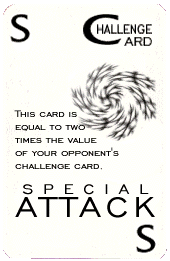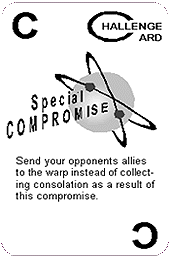Special Challenge Cards
|
Special Challenge cards have variable value, usually dependent upon the card played by their opponent. There are special Attack cards and special Compromise cards. For all intents and purposes if you play a Special Challenge card you have played a card of the value it calculates out to. Any calculations take place before any power effects. For example: If Red plays a 10 and Green plays a special challenge card that says "Your total equals the total played by your opponent minus 1" then the outcome is; Red 10, Green 9. If Green was the mirror (and she had reversed the cards) than outcome would be; Red 1, Green 90!
A compromise card is a zero for the purposes of calculation (for powers like the Count or the Capacitor). If two Special Challenge cards are played that create a paradox, the card played by the offensive player is considered to be a zero. For example if red attacks green system with a "Your opponent's card X 2" and green defends with a "Your opponent's card +5 then the total is; Red 0, Green 5.
|  |
Along similar lines, any power that seeks to reveal a value for a special attack card before the card can be calculated shows the card to be worth zero. If the owner has reason to KNOW what his or her card will be he or she must answer truthfully otherwise they MUST assume their card is zero. For example: "Red, are you going to play a card greater then 5?" (assuming there is some force in play obliging red to answer blue's question truthfully).
Red who has a 'number of bases you own times your opponents card' challenge card would have to answer "No, blue".
If Red had seen the card that blue was playing (suppose a 40) Red would then have to answer "Yes". Likewise if Red was planning to play a 'number of players in the game' challenge card and there were six players red would have to answer "Yes".
Special Compromise cards are treated just like normal compromise cards except for the differences noted on the card. They typically change the reward for the compromising player. Unless noted otherwise on the card, a special compromise VS. another compromise (normal or special) causes a deal; the special compromise effects are ignored.
|  |
Here are some examples:
Special Attack
EQUAL - This card is equal to the challenge card played by your opponent.
Times Two - This card is equal to the challenge card played by your opponent times two.
# BASES - This card is equal to the number of bases you own (including home and moon bases).
LUCRE - This card is equal to the total amount of Lucre you possess.
SAFE - This card is equal to the number of tokens you have OUT of the warp.
Opponent's CARDS - This card is equal to the number of cards held by your opponent.
Opponent's BASES - This card is equal to the number of bases your opponent owns (including home and moon bases).
Opponent's LUCRE - This card is equal to the total amount of Lucre your opponent possess.
Half - This card is equal to half the challenge card played by your opponent.
TOKENS - This card is equal to the number of tokens involved in this challenge.
Special Compromise
Collect double consolation as a result of this compromise.
Collect half consolation as a result of this compromise.
Collect lucre for consolation instead of cards as a result of this compromise.
Collect normal consolation as a result of this compromise but only lose one token.
Collect consolation from your opponents allies as well as your opponent as a result of this compromise.
Collect from the deck (instead of your opponent) any consolation resulting of this compromise.
Send your opponents allies to the warp instead of collecting consolation as a result of this compromise.
Your allies go home instead of to the warp. Collect normal consolation as a result of this compromise.
Expansion by Jack Reda
See also Morph  
| 
